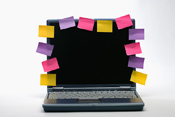
|
|
Protecting passwords for email and online banking

The internet has made day to day living more convenient and accessible than ever, through such things as communicating with friends and family members through email, and you can pay bills and manage your bank accounts conveniently online.
Many people, however, worry about the safety of their information, especially personal emails and financial information. Passwords and encryption make it difficult to access your personal information, but many people choose passwords that are easily hacked into, making their emails and banking information more vulnerable.
The following are some tips for protecting your passwords for email and online banking.
|
|
Choose your password carefully
Hackers know that passwords can be difficult to remember, so people often choose things that are easy for them to recall, such as birthdays and anniversaries. However, this is typically the first type of password a hacker will try. Sophisticated hackers can easily find your birthday or marriage date doing simple public internet searches, so it's important that you choose a password that isn't easily guessed.
Passwords you should never use include:
-
- Your phone number.
- - Your email address. This also includes user names and the name or words in front of your domain.
- - Subtle variations to a word or date. For example, putting a "_" in between your first and last name or reversing the numbers of your birth date.
- - Your Social Security number. (In addition, you should never give out your Social Security number online or on the phone, unless it's a trusted site or unless you have initiated the call to a trusted source.)
- - Your address. This includes past addresses as well, as these are easily obtained.
- - Birthdates. This is especially true of your own and of those in your immediate family, such as a spouse or your children
- - Names of people you know. This includes your own name and your family member's names especially, including middle names and maiden names.
- - Months of the year. Don't use just the month of your birthday, or your anniversary, or other important month either. This is a common password and easily hacked.
- - Your employer. Don't use the name of the company you work for as a password either.
When choosing a secure password, consider the following tips.
-
- Use a combination of letters and numbers. This can include punctuation as well.
- - Make your password at least 8 characters long.
- - Consider taking the first letters of a sentence; for example, say your sentence is, "I have 2 dogs-Butch and Bowser." Your password would be: Ih2d-B&B. This method is very secure and fairly easy to remember.
Never share your password.
This may go without saying, but don't give out your password to other people. Never write it down on a post-it note either and stick it on your computer, as this can compromise your security online.
Change your password frequently.
You should change your password to your email and banking account information on a regular basis. This is especially true if you think that someone might know it. Changing your password is easily done online through Options and Security tabs.
Your email and bank account information contain a wide range of personal information that could be very damaging if in the wrong hands. The above tips will help you to not only choose secure passwords, but protect them as well.
Privacy Policy, Terms of Use